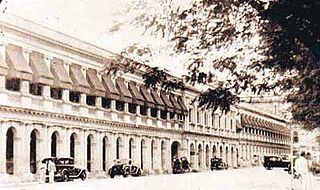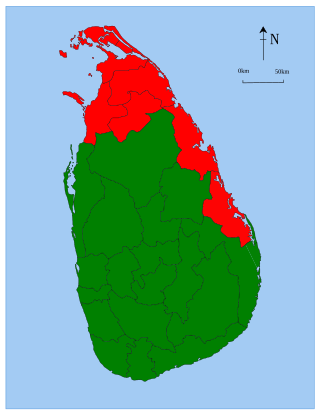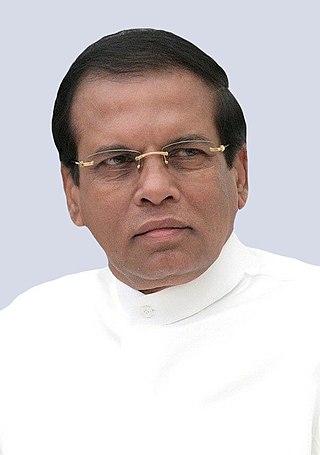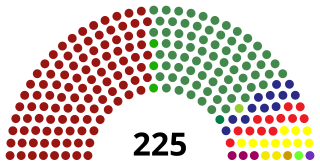
The president of Sri Lanka is the head of state and head of government of the Democratic Socialist Republic of Sri Lanka. The president is the chief executive of the union government and the commander-in-chief of the Sri Lanka Armed Forces. The powers, functions and duties of prior presidential offices, in addition to their relation with the Prime minister and Government of Sri Lanka, have over time differed with the various constitutional documents since the creation of the office. The president appoints the Prime Minister of Sri Lanka who can command the confidence of the Parliament of Sri Lanka.

The Parliament of the Democratic Socialist Republic of Sri Lanka is the supreme legislative body of Sri Lanka. It alone possesses legislative supremacy and thereby ultimate power over all other political bodies in the island. It is modeled after the British Parliament. The 17th Parliament of Sri Lanka will convene for the first time on 21 November 2024.

Mahinda Rajapaksa is a Sri Lankan politician. He served as the sixth President of Sri Lanka from 2005 to 2015; the Prime Minister of Sri Lanka from 2004 to 2005, 2018, and 2019 to 2022; the Leader of the Opposition from 2002 to 2004 and 2018 to 2019, and the Minister of Finance from 2005 to 2015 and 2019 to 2021.

The Supreme Court of Sri Lanka is the highest court in Sri Lanka and the final judicial instance of record. Established in 1801 and empowered to exercise its powers subject to the provisions of the Constitution of Sri Lanka, the Supreme Court has ultimate appellate jurisdiction in constitutional matters and takes precedence over all lower courts. The Sri Lankan judicial system is a complex blend of common law and civil law. In some cases, such as those involving capital punishment, the decision may be passed on to the President of Sri Lanka for clemency petitions. The current Chief Justice of Sri Lanka is Murdu Fernando.

The Constitution of the Democratic Socialist Republic of Sri Lanka has been the constitution of the island nation of Sri Lanka since its original promulgation by the National State Assembly on 7 September 1978. As of October 2022 it has been formally amended 21 times.

The Senate was the upper chamber of the parliament of Ceylon established in 1947 by the Soulbury Commission. The Senate was appointed and indirectly elected rather than directly elected. It was housed in the old Legislative Council building in Colombo Fort and met for the first time on 12 November 1947. The Senate was abolished on 2 October 1971 by the eighth amendment to the Soulbury Constitution, prior to the adoption of the new Republican Constitution of Sri Lanka on 22 May 1972. In 2010 there were proposals to reintroduce the Senate.

The House of Representatives was the lower chamber of the parliament of Ceylon established in 1947 by the Soulbury Constitution. The House was housed in the old State Council building in Galle Face Green, Colombo and met for the first time on 14 October 1947. The First Republican Constitution of Sri Lanka, adopted on 22 May 1972, replaced the House of Representatives with the unicameral National State Assembly.

The National State Assembly (NSA) was the legislative body of Sri Lanka established in May 1972 under the First Republican Constitution. The assembly was introduced by Prime Minister Sirimavo Bandaranaike under the United Front Government replacing the Parliament of Ceylon, a bicameral arrangement set up with the Soulbury Commission.

A referendum on extending the term of parliament by six years was held in Sri Lanka on 22 December 1982. It was the first and so far only national referendum to be held in the country. The referendum was called for by President J. R. Jayawardene, who had been elected to a fresh six-year term as President in October 1982. With the life of the current parliament due to expire in August 1983, Jayawardene faced the possibility of his ruling United National Party losing its massive supermajority in parliament if regular general elections were held. He therefore proposed a referendum to extend the life of parliament, with its constituents unchanged, thereby permitting the United National Party to maintain its supermajority.

The prime minister of Sri Lanka, officially the prime minister of the Democratic Socialist Republic of Sri Lanka is the most senior member of parliament in the cabinet of ministers. It is the second-most powerful position in Sri Lanka's executive branch behind the president, who is the constitutional chief executive. The Cabinet is collectively held accountable to parliament for their policies and actions. The powers and functions of the Prime Minister has changed several times since the creation of the office in 1947.

Shirani Bandaranayake, the 43rd Chief Justice of Sri Lanka, was impeached by Parliament and then removed from office by President Mahinda Rajapaksa in January 2013. Bandaranayake was accused of a number of charges including financial impropriety and interfering in legal cases, all of which she has denied. The impeachment followed a series of rulings against the government by the Supreme Court, including one against a bill proposed by Minister Basil Rajapaksa, President Rajapaksa's brother. Bandaranayake was replaced as chief justice by former Attorney General Mohan Peiris. Peiris is considered to be an ally of President Rajapaksa and his appointment is seen by critics as further consolidation of power by the president and his family. Bandaranayake refused to recognise the impeachment and lawyers groups refused to work with the new chief justice. Bandaranayake's controversial impeachment drew much criticism and concern from within and outside of Sri Lanka. On 28 January 2015 she was reinstated and retired on 29 January, the next day.
The 19th Amendment (19A) to the Constitution of Sri Lanka was passed by the 225-member Sri Lankan Parliament with 215 voting in favor, one against, one abstained and seven were absent, on 28 April 2015. The amendment envisages the dilution of many powers of Executive Presidency, which had been in force since 1978. It is the most revolutionary reform ever applied to the Constitution of Sri Lanka since JR Jayawardhane became the first Executive President of Sri Lanka in 1978.
The 15th Parliament of Sri Lanka was the meeting of the Parliament of Sri Lanka with its membership determined by the results of the 2015 parliamentary election, held on 17 August 2015. The parliament met for the first time on 1 September 2015 and was dissolved on 3 March 2020.
The Constitutional Council (CC) is a 10-member constitutional authority in Sri Lanka tasked with maintaining independent commissions and monitoring its affairs. The Constitutional Council is aimed at depoliticizing the public service.

A constitutional crisis began in Sri Lanka when President Maithripala Sirisena appointed former president and member of parliament Mahinda Rajapaksa as prime minister on 26 October 2018 before formally dismissing the incumbent Ranil Wickremesinghe, resulting in two concurrent prime ministers. Wickremesinghe and the United National Party (UNP) viewed the appointment as illegal, and he refused to resign.

Parliamentary elections were held in Sri Lanka on 5 August 2020 to elect 225 members to Sri Lanka's 16th Parliament. 16,263,885 people were eligible to vote in the election, 31.95% of whom were young voters.

The 16th Parliament of Sri Lanka was the meeting of the Parliament of Sri Lanka with its membership determined by the results of the 2020 parliamentary election held on 5 August 2020. The parliament met for the first time on 20 August 2020 and was dissolved on 24 September 2024.
The bill titled as Colombo Port City Economic Commission Bill is regarded as one of the important legislations to be passed in the Parliament of Sri Lanka as it is related to the Colombo Port City project, which is the biggest foreign investment received by Sri Lanka from China in the country's history. The bill was slated and deemed as controversial as critics feared that China could influence in Sri Lankan territory through the Port City project.
The Twenty-first Amendment (21A) to the Constitution of Sri Lanka was passed by the 225-member Sri Lankan Parliament with 179 voting in favor, 1 against and 45 abstained on 21 October 2022. The bill was passed with a two-third majority and it was reported that only one MP, Sarath Weerasekara, voted against the bill while 45 MPs were notably absent when the bill was passed in the parliament. The 21st Amendment was originally known as the 22nd Amendment in the political discourse and according to Newsfirst the said amendment would be added to Sri Lankan legislation as the 21st Amendment. The draft amendment was formulated during the critical juncture in Sri Lanka at a time when the country was reeling from massive economic crisis, political chaos and massive anti-government crackdowns. Major changes were made to the text of the draft of the 22nd amendment following the ousting of Gotabaya Rajapaksa. The draft was initially presented to the parliament by Minister of Justice, Prison Affairs and Constitutional Reforms Wijeyadasa Rajapakshe. in August 2022 and the cabinet granted approval for the draft. The 22nd Amendment was initially tabled in the Cabinet on 6 June 2022 by Wijeyadasa Rajapakshe and the discussion on it had been adjourned on multiple occasions due to the failure to reach a consensus after series of disagreements.













